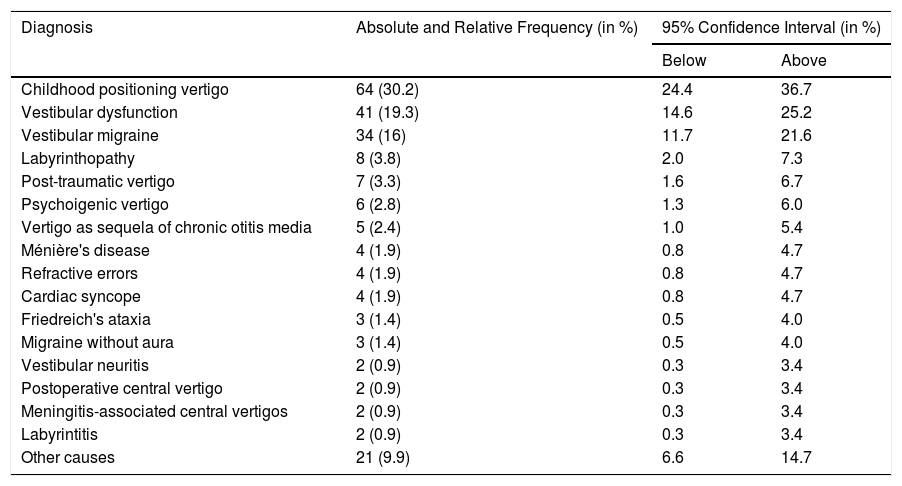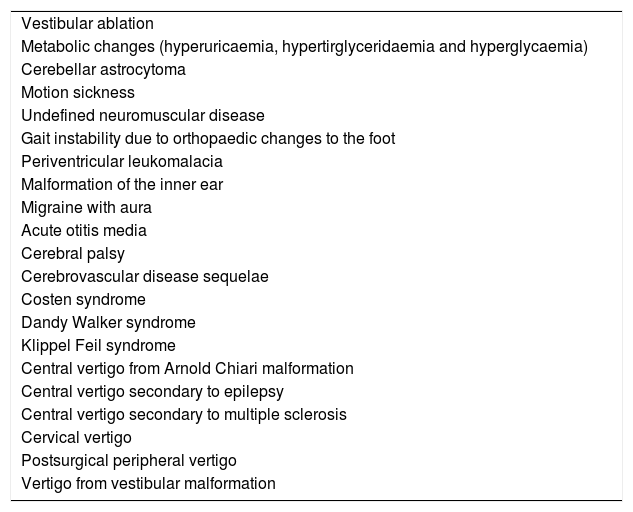Vertigo is a seldom studied symptom in the paediatric population, where the prevalence is less than 1%. Vestibular disorders in children are not comparable to those of adults and are often underdiagnosed. Identifying the main causes of these disorders would provide reliable and accurate data of the diseases in certain age groups, improving the diagnostic process.
Material and methodsObservational, cross-sectional, and retrospective study. Consecutive records of patients, aged 3–17years, attended due to vestibular, balance and associated symptoms (vertigo, dizziness, hearing loss, balance disorders and headache), attended by the otoneurology service of a tertiary hospital, between September 2010 and September 2018, were included. Descriptive and inferential statistics were used for the analysis. All P-values reported from these analyses were two-tailed with a significance level <.05.
Results212 cases were registered from 6444 consultations (3.3%). The proportion between males and females was similar. The mean age of the group was 14.5 (±3.9) years, the median age of onset of symptoms was 11 (IQR 8–14) years and that of the first consultation was 13 (IQR 10–15) years. As a cardinal symptom, 51.9% attended due to vertigo, 25.5% due to dizziness, 9.9% due to gait instability, 7.5% due to hearing loss and 5.2% due to headache. Of the episodes of vertigo, 61.8% were of peripheral origin, 69 32.5% central and 12 5.7% outside the vestibular system. Benign paroxysmal vertigo of childhood, dysfunction and vestibular migraine accounted for more than 65% of cases. No differences were found between the diagnoses regarding the sex and age of the participants (P>.05).
ConclusionVestibular and balance disorders are rare in the study population and most of the causes are benign and potentially self-limited disorders.
El vértigo es un síntoma poco estudiado en la población pediátrica, donde la prevalencia es inferior al 1%. Los trastornos vestibulares en el niño no son equiparables a los del adulto y a menudo son subdiagnosticados. Identificar las principales causas de estos trastornos proporcionaría datos fidedignos y precisos de las enfermedades en ciertos grupos de edad, mejorando el proceso de diagnóstico.
Material y métodosEstudio observacional, transversal y retrospectivo. Se revisaron los expedientes consecutivos de pacientes, de entre 3 y 17años, atendidos por síntomas vestibulares, del equilibrio y asociados (vértigo, mareo, hipoacusia, alteraciones del equilibrio y cefalalgia) en el servicio de Otoneurología de un hospital de tercer nivel de atención entre septiembre de 2010 y septiembre de 2018. Se utilizó estadística descriptiva e inferencial para el análisis. Todos los valores de p informados de estos análisis fueron de dos colas con un nivel de significación <0,05.
ResultadosSe registraron 212 casos entre 6.444 consultas, por lo que la frecuencia fue del 3,3%. La proporción entre hombres y mujeres fue similar. La edad media del grupo fue de 14,5 (±3,9) años, la mediana de la edad de inicio de los síntomas fue de 11 (RIC 8-14) años y la de la primera consulta fue de 13 (RIC 10-15) años. Como síntoma cardinal, el 51,9% acudieron por vértigo, el 25,5% por mareo, el 9,9% por inestabilidad de la marcha, el 7,5% por hipoacusia y el 5,2% por cefalalgia. El 61,8% de los episodios de vértigo tuvieron un origen periférico, el 32,5% central y el 5,7% fuera del sistema vestibular. El vértigo paroxístico benigno de la infancia, la disfunción y migraña vestibular representaron más del 65% de los casos. No se encontraron diferencias entre los diagnósticos con respecto al sexo y la edad de los participantes (p>0,05).
ConclusiónLos trastornos vestibulares y del equilibrio son poco frecuentes en la población estudiada y en la mayoría de los casos se trata de trastornos benignos y potencialmente autolimitados.











